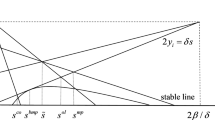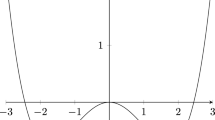Abstract
In this paper, we address the mixed stochastic \(H_{2}/H_{\infty }\) control problem for a mean-field jump-diffusion system, where the state equation is influenced by both a standard Brownian motion and a Poisson random martingale measure. The control input is treated as a leader, while the disturbance is considered a follower, employing the Stackelberg game approach. Our paper makes the following key contributions: (i) Initially, we treat the \(H_{\infty }\) problem as the follower problem. Utilizing the stochastic maximum principle, we obtain the optimal open-loop solution for the follower and derive an explicit feedback representation of the optimal control, associated with the follower problem. This feedback representation is obtained through coupled Riccati differential equations (CRDEs) using the Four-Step Scheme. (ii) Subsequently, we address the \(H_{2}\) problem as the leader problem. By applying the convex variational method, we establish the mean-field stochastic maximum principle. However, due to technical complexities related to the jump process, we consider two distinct situations. In both cases, we introduce new state variables and effectively employ the Four-Step Scheme to obtain the explicit feedback representation of the optimal control for the leader problem. (iii) We demonstrate that the open-loop Stackelberg equilibrium point can be characterized by a feedback representation, which incorporates both the state and its expected value. (iv) To enhance the practicality of our model, we present an example of a PA problem involving moral hazard, illustrating the corresponding optimal contract and optimal strategy. Therefore with our proposed methodologies and solutions, we contribute valuable insights into the mixed stochastic \(H_{2}/H_{\infty }\) control problem for mean-field jump-diffusion systems. And our findings offer significant implications for understanding and addressing such complex control problems in various real-world scenarios.

Similar content being viewed by others
References
Frankowska, H., Quincampoix, M.: Dissipative control systems and disturbance attenuation for nonlinear \(H_{\infty }\) problems. Appl. Math. Optim. 40(2), 163–181 (1999)
da Ponte, C.R., Assunção, E., Minhoto Teixeira, M.C.: \(H_{2}/H_{\infty }\) formulation of LQR controls based on LMI for continuous-time uncertain systems. Int. J. Syst. Sci. 52(3), 612–634 (2021)
Scherer, C., Gahinet, P., Chilali, M.: Multiobjective output-feedback control via LMI optimization. IEEE Trans. Automat. Control 42(7), 896–911 (1997)
Haddad, W.M., Lanchares, M., Chen, Y.: Mixed norm \(H_{2}/H_{\infty }\) and entropy covariance control: a convex optimisation approach. Int. J. Control 95(4), 985–995 (2022)
Rotea, M., Khargonekar, P.: Mixed \(H_{2}/H_{\infty }\) control: A convex optimization approach. IEEE Trans. Automat. Control 36(5), 824–837 (1991)
Limebeer, D.J.N., Anderson, B.D.O., Hendel, B.: A Nash game approach to mixed \(H_{2}/H_{\infty }\) control. IEEE Trans. Automat. Control 39(1), 69–82 (1994)
Zhang, W., Xie, L., Chen, B.S.: Stochastic \(H_{2}/H_{\infty }\) control: A Nash game approach. CRC Press, Boca Raton, FL (2017)
Jungers, M., Trélat, E., Abou-Kandil, H.: A Stackelberg game approach to mixed \(H_{2}/H_{\infty }\) control. IFAC Proceedings Vol. 41(2), 3940–3945 (2008)
Xie, T., Feng, X., Huang, J.: Mixed Linear Quadratic Stochastic Differential Leader-Follower Game with Input Constraint. Appl. Math. Optim. 84(1), 215–251 (2021)
Chen, B., Zhang, W.: Stochastic \(H_{2}/H_{\infty }\) control with state-dependent noise. IEEE Trans. Automat. Control 49(1), 45–57 (2004)
Zhang, W., Zhang, H., Chen, B.S.: Stochastic \(H_{2}/H_{\infty }\) control with (x, u, v)-dependent noise: Finite horizon case. Automatica 42(11), 1891–1898 (2006)
Zhang, W., Huang, Y., Zhang, H.: Stochastic \(H_{2}/H_{\infty }\) control for discrete-time systems with state and disturbance dependent noise. Automatica 43(3), 513–521 (2007)
Zhang, W., Huang, Y., Xie, L.: Infinite horizon stochastic \(H_{2}/H_{\infty }\) control for discrete-time systems with state and disturbance dependent noise. Automatica 44(9), 2306–2316 (2008)
Wu, K.N., Guo, B., Zhang, W., et al.: Mixed \(H_{2}/H_{\infty }\) control for linear infinite-dimensional systems. Int. J. Control Automat. Syst. 14(1), 128–139 (2016)
Von Stackelberg, H., Von, S.H.: The theory of the market economy. Oxford University Press, Oxford (1952)
Chen, C.I., Cruz, J.B., Jr.: Stackelburg solution for two-person games with biased information patterns. IEEE Trans. Automat. Control 17(6), 791–798 (1972)
Simaan, M., Cruz, J.B., Jr.: On the Stackelberg strategy in nonzero-sum games. J. Optim. Theo. Appl. 11(5), 533–555 (1973)
Abou-Kandil, H., Bertrand, P.: Analytical solution for an open-loop Stackelberg game. IEEE Trans. Automat. Control 30(12), 1222–1224 (1985)
Freiling, G., Jank, G., Lee, S.R.: Existence and uniqueness of open-loop Stackelberg equilibria in linear-quadratic differential games. J. Optim. Theo. Appl. 110(3), 515–544 (2001)
Yong, J.: A leader-follower stochastic linear quadratic differential game. SIAM J. Control Optim. 41(4), 1015–1041 (2002)
Lin, Y., Jiang, X., Zhang, W.: An open-loop Stackelberg strategy for the linear quadratic mean-field stochastic differential game. IEEE Trans. Automat. Control 64(1), 97–110 (2018)
Moon, J., Basar, T.: Linear quadratic mean field Stackelberg differential games. Automatica 97, 200–213 (2018)
Moon, J.: Linear-quadratic mean-field type stackelberg differential games for stochastic jump-diffusion systems. Math. Control & Related Fields 12(2), 371 (2022)
Bagchi, A., Basar, T.: Stackelberg strategies in linear-quadratic stochastic differential games. J. Optim. Theo. Appl. 35(3), 443–464 (1981)
Zhu, H.N., Zhang, C.K., Sun, P.H., et al.: A Stackelberg game approach to mixed \(H_{2}/H_{\infty }\) robust control for singular bilinear systems[C]//Advanced Materials Research. Trans. Tech. Publ. Ltd. 204, 1839–1847 (2011)
Mukaidani, H.: \(H_{2}/H_{\infty }\) control of stochastic systems with multiple decision makers: A Stackelberg game approach[C]//52nd IEEE Conference on Decision and Control. IEEE (2013): 1750–1755
Mukaidani, H., Tanabata, R., Matsumoto, C.: Dynamic game approach of \(H_{2}/H_{\infty }\) control for stochastic discrete-time systems. IEICE Trans. Fundam. Electron. Commun. Comput. Sci. 97(11), 2200–2211 (2014)
Mukaidani, H.: Stackelberg strategy for discrete-time stochastic system and its application to \(H_{2}/H_{\infty }\) control[C]//2014 American Control Conference. IEEE 4488–4493 (2014)
Li, X., Wang, W., Xu, J., et al.: Stackelberg game approach to mixed \(H_{2}/H_{\infty }\) problem for continuous-time system. J. Syst. Sci. Complex 32(5), 1324–1339 (2019)
Shen, Y., Meng, Q., Shi, P.: Maximum principle for mean-field jump-diffusion stochastic delay differential equations and its application to finance. Automatica 50(6), 1565–1579 (2014)
Yong, J.: Linear-quadratic optimal control problems for mean-field stochastic differential equations. SIAM J. Control Optim. 51(4), 2809–2838 (2013)
Elliott, R., Li, X., Ni, Y.H.: Discrete time mean-field stochastic linear-quadratic optimal control problems. Automatica 49(11), 3222–3233 (2013)
Ni, Y.H., Li, X., Zhang, J.F.: Indefinite mean-field stochastic linear-quadratic optimal control: from finite horizon to infinite horizon. IEEE Trans. Automat. Control 61(11), 3269–3284 (2015)
Huang, J., Li, X., Yong, J.: A linear-quadratic optimal control problem for mean-field stochastic differential equations in infinite horizon. Math. Control Relat. Fields 5(1), 97 (2015)
Meng, Q., Dong, Y., Shen, Y., et al.: Optimal Controls of Stochastic Differential Equations with Jumps and Random Coefficients: Stochastic Hamilton-Jacobi-Bellman Equations with Jumps. Appl. Math. Optim. 87(1), 1–51 (2023)
Boel, R., Varaiya, P.: Optimal control of jump processes. SIAM J. Control Optim. 15(1), 92–119 (1977)
Meng, Q., Shen, Y.: Optimal control of mean-field jump-diffusion systems with delay: A stochastic maximum principle approach. J. Comput. Appl. Math. 279, 13–30 (2015)
Yang, Y., Tang, M., Meng, Q.: A mean-field stochastic linear-quadratic optimal control problem with jumps under partial information. ESAIM: Control Optim. Calc. Var. 28, 53 (2022)
Shen, Y., Siu, T.K.: The maximum principle for a jump-diffusion mean-field model and its application to the mean-variance problem. Nonlinear Anal. Theo. Methods Appl. 86, 58–73 (2013)
Horn, R.A., Johnson, C.R.: Matrix analysis. Cambridge University Press, Cambridge (2012)
Cvitanic, J., Zhang, J.: Contract theory in continuous-time models. Springer Science & Business Media, Germany (2012)
Funding
The authors have not disclosed any funding.
Author information
Authors and Affiliations
Corresponding author
Ethics declarations
Conflict of Interests
The authors have not disclosed any competing interests.
Additional information
Publisher's Note
Springer Nature remains neutral with regard to jurisdictional claims in published maps and institutional affiliations.
Q. Meng was supported by the Key Projects of Natural Science Foundation of Zhejiang Province (No. Z22A013952) and the National Natural Science Foundation of China (No. 12271158 and No. 11871121).
Rights and permissions
Springer Nature or its licensor (e.g. a society or other partner) holds exclusive rights to this article under a publishing agreement with the author(s) or other rightsholder(s); author self-archiving of the accepted manuscript version of this article is solely governed by the terms of such publishing agreement and applicable law.
About this article
Cite this article
Zhang, S., Zhang, W. & Meng, Q. Stackelberg Game Approach to Mixed Stochastic \(H_{2}/H_{\infty }\) Control for Mean-Field Jump-Diffusions Systems. Appl Math Optim 89, 6 (2024). https://doi.org/10.1007/s00245-023-10074-6
Accepted:
Published:
DOI: https://doi.org/10.1007/s00245-023-10074-6




